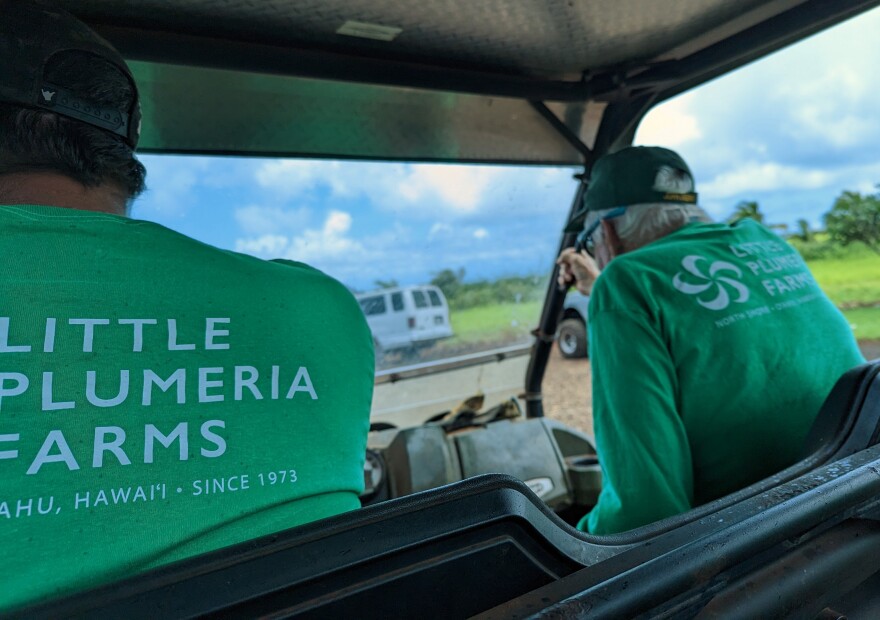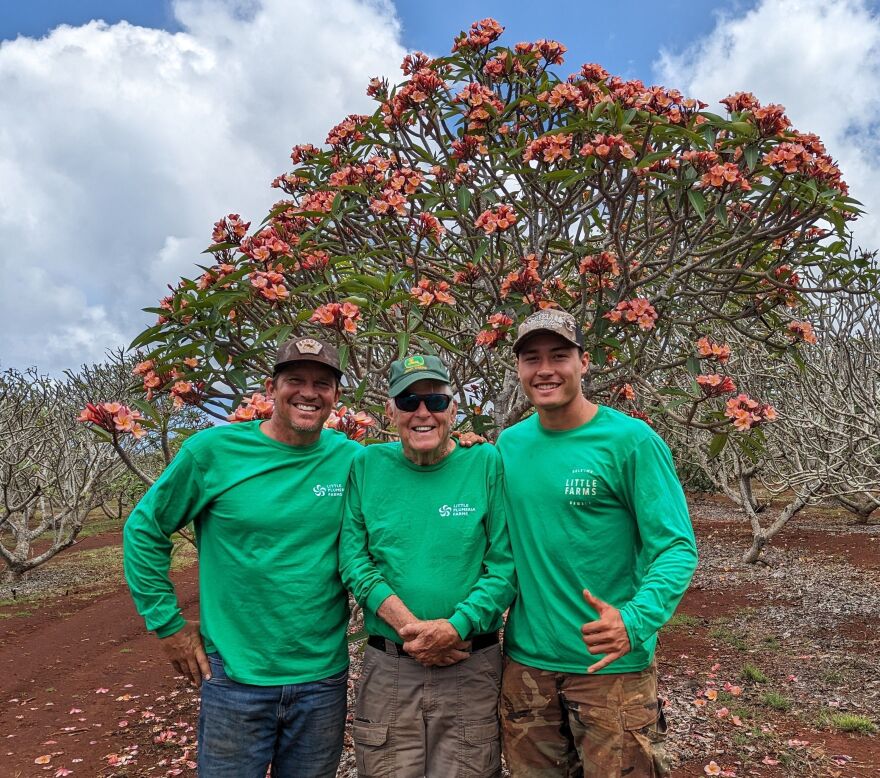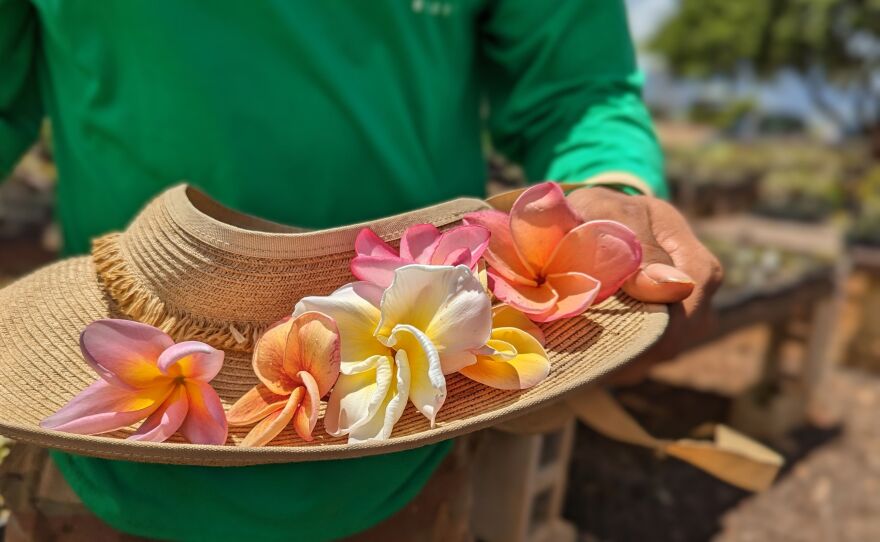Jim Little's love affair with plumeria began in 1973 after an overgrown tree supplied him with a yard full of cuttings. Fifty years later, he and his family are now welcoming visitors to tour their Haleʻiwa plumeria farm for the first time. Tours appropriately began on Lei Day, May 1.
Little's frangipani fascination took off after learning how to hybridize from Bill Moragne, who is regarded as the pioneer of the cross-pollinating technique.
Since then, Little has garnered global recognition for creating thousands of new varieties, each with unique scents, colors and shapes. Collectors pay top dollar for the fruits of his labor.
These days he shares his plumeria passion with his son Clark and grandson Dane. You may be familiar with Clark Little's ocean photography as well. The Conversation visited the Oʻahu farm to talk with the three generations, starting with the original Little — Jim.
Jim Little on discovering the world of plumeria hybridization in 1973
JIM LITTLE: It started when the tree was banging against the house. And I had a cut it down because it was keeping everybody awake at night. So I cut it down. And then I had all these branches, and I didn't know what to do with them. And I asked the landscape supervisor what to do and he says, "Just stick them in the can and grow them." So I sampled that out, put about 40 in a can — and these were big soup cans. In about three months, they started to flower and I didn't know what to do with them. So I took them down to a garden center down by the Ward Warehouse and I asked the garden center manager if he'd be interested in selling them and he said, "No, I have no interest in selling plumerias. People in Hawaiʻi just break them off and stick them in the ground and they grow." Well, I said, "Would you be interested maybe in taking them on consignment?" And he said OK. He was reluctant. But he said, "I'll try." Oh, he took them and 10 days later, he calls me back and said, "We sold all the plumerias, you got more?" And then I said this is the beginning of something that has a lot of interest for me. From there on in, I started to collect plumerias and I met with growers who taught me some of the skills and then I joined all the nursery associations in Hawaiʻi to mix with people that were professional and I learned a great deal from them. And then after I found out how easy it was to grow plumerias, then I started to collect everything I could, until eventually I met the late Bill Moragne who showed me how to hybridize. Once I learned how to hybridize, we started to make new babies and new colors.

Clark Little on sharing his father's love for plumeria and plants
CLARK LITTLE: In 1973, I was 5. So back then I wasn't doing much but I had an interest in plants. My dad taught me from a young age. He built a nursery and he started developing plumeria farms. And he taught me everything I needed or wanted to know about growing all plants. I've been doing it, gosh, for probably 25 years, at least, maybe even 30 years. It's just nice that he taught me so much. Because he has a wealth of information. And I've been able to gather that and then share it actually with my son. And that's kind of cool that we can drop it to three generations and we all love growing plumerias, we all love plants. And we're super excited to be developing all kinds of new flowers and creations and finally opening up our plumeria farm to the public, celebrating my dad's 50th year of plumeria growing. And it's a special thing. We're very, very excited, very optimistic. And there's just so much fun things that we love to do and it's nice to be able to share our knowledge with other people.

CLARK LITTLE: We have thousands in the ground right now that will be brand new, you know, whether they're gorgeous, which we're hoping or they're not as beautiful — we just haven't seen them. And the excitement of not knowing is part of it. But you want to, you want to go out there and look, is there a flower head? I mean, the excitement of there's new leaves coming out. I mean, the little things actually, kind of get us really excited. And it's simple, but it is long. It does take sometimes three to five years from when you plant the seed for it to show its flower. It's a waiting game. But boy, it's worth it when you get a knockout like Metallica and Hawaiian Fire and Dane. These are all JL varieties. We have so many that my dad has developed along this journey. And now Dane is planting thousands. "That's enough boy," my dad keeps saying and Dane's like "No, let's keep the Little Farms going."
The youngest of the trio, Dane Little, on being born into the plumeria world
DANE LITTLE: I've been at this farm ever since I was a little kid. And it's just, it's beautiful up here. I love looking at the flowers. I didn't go to school for this but coming back from college, I started a job at UPS. And it was just the first job. It was during COVID and it was a good experience, but then I started getting into plumerias with my grandpa and father. I've come to love it more and more as the years go by. And I'm super grateful that they allowed me to have this opportunity to work on a farm, a beautiful farm.
Clark Little on adding photography to his skill book alongside his green thumb
CLARK LITTLE: I actually worked for Wahiawā Botanical Garden. I was a supervisor up there for 17 years. It was a fun job. I loved it. I enjoyed it until my photography took off which just throw a curveball in my whole life and in a good way. I had to make a decision to leave the botanical garden and be a photographer which I ended up doing and made the right choice. And that's been successful and blossoming for me. But I never gave up the green thumb. I've always visited the farm, I've always worked with my dad and I still love working with plumerias.
CLARK LITTLE: My dad taught photography at Punahou and Leeward Community College for many, many years and so it's kind of in the blood. And so we, including Dane, take photos and put them on the website. Now we're taking photos of the whole plumeria farm just for the tours and kind of getting prepped... It's a special place and this farm is just unbelievably gorgeous. I mean, it really is, it's a kind of a peaceful place, and to have it surrounded with plumeria fragrances and colors and just being up here in paradise.
On maintaining the farm and starting tours for the public
CLARK LITTLE: We have an awesome crew that comes on Saturdays, which is anywhere from four to five people. They do a lot of the pulling weeds and there's fertilizing, there's endless other things that we do to upkeep this place. We also have people that come in one or two days a week doing other things. And we're going to be getting probably some more help. We need to, you know, especially for the farm tours and things but it's just something that we're working on and kind of going with the flow right now. Like the botanical garden that I worked at, the experience to make this place beautiful, I mean, fortunately, I've been blessed with all that experience to turn this place at least into a garden, into a botanical garden. How cool is that? I mean, I feel like I can take my experience and have my own private botanical garden now. That's sort of how it feels. So my dad, I mean, doing all that footwork, legwork to get this whole place started and then Dane and I coming in and kind of enhancing it, to beautify and get it all ready for people to enjoy.

Final thoughts from Jim Little
JIM LITTLE: One of the greatest joys that I have is being able to teach which I've been doing all my life. And then I'm so thankful that we can keep it in the family and share the beauty with others that are interested. And I'm just very, very fortunate and couldn't be happier to have it be a family operation. I'm thankful every day that I have my family involved.
Tours of Little Plumeria Farms are slated to run through Oct. 31. Tours begin at $45 for adults and $25 for keiki. Click here to learn more.
This interview aired on The Conversation on May 1, 2023. The Conversation airs weekdays at 11 a.m. on HPR-1. This story was adapted for the web by Sophia McCullough.



















